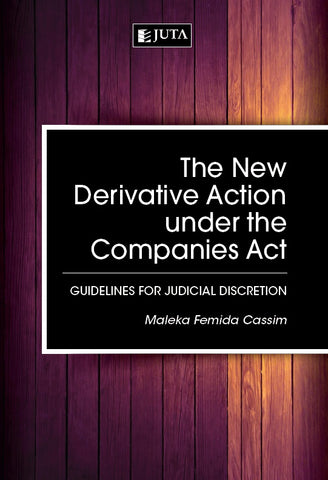
New Derivative Action under the Companies Act, The: Guidelines for Judicial Discretion (2016), 1st Edition
Product Details:
| Author(s): | Cassim, M F |
| Page count: | 290 |
| ISBN: | 9781485109754 |
| Languages(s): | English, |
| Year Published: | 2016 |
| Categories: | Corporate and Commercial Law, Law, Law, Law, |
| Type: |
About this publication
The proper protection of minority shareholders is a cornerstone of any well-developed corporate law system. Pivotal to the minority shareholder’s armoury is the derivative action. Section 165 of the South African Companies Act 71 of 2008 introduces the new statutory derivative action, and entrusts the court with a key function as the gatekeeper to the derivative action. The courts have an important filtering function and may disallow applications for derivative actions that are frivolous, vexatious or without merit. The vital judicial discretion to grant or refuse leave to an applicant to bring a derivative action is the crux of the new statutory derivative action. The court is required to exercise its discretion with reference to three important but vague guiding criteria for the grant of leave to institute a derivative action. Thus the courts have been entrusted by the legislature to flesh out the details, the contours, and the practical application of these guiding criteria. This crucially endows the courts with a dominant and decisive role in shaping the effectiveness of this much-needed new remedy.
The New Derivative Action under the Companies Act is primarily aimed at developing guidelines for the exercise of the judicial discretion in the field of the new statutory derivative action. It takes into account valuable principles gleaned from other comparable jurisdictions such as Canada, Australia, New Zealand, the United Kingdom and the United States of America. The book also discusses the overlap between the derivative action and the oppression remedy.
Content
- Introduction
- The procedure for the statutory derivative action
- Discretion of the court to grant leave for a derivative action: foundational policies and principles
- The criterion of good faith
- Trial of a serious question
- The best interests of the company
- The rebuttable presumption: defects and cures
- Shareholder ratification
- Orders of costs, and other hurdles and obstacles
- Overlap with the oppression remedy
- Appendix: statutory provisions
We Also Recommend





